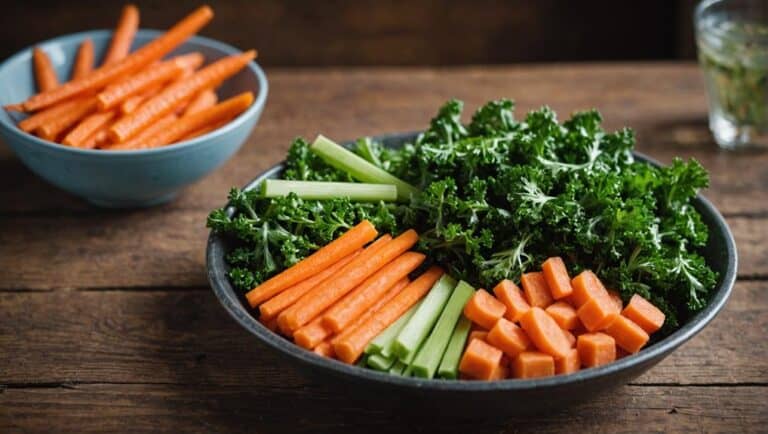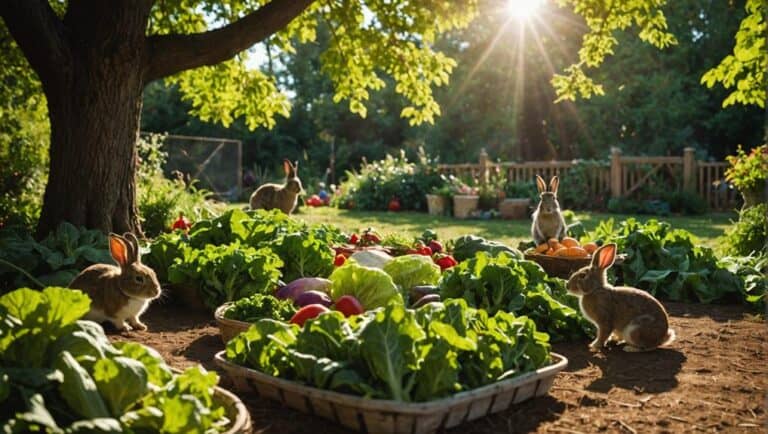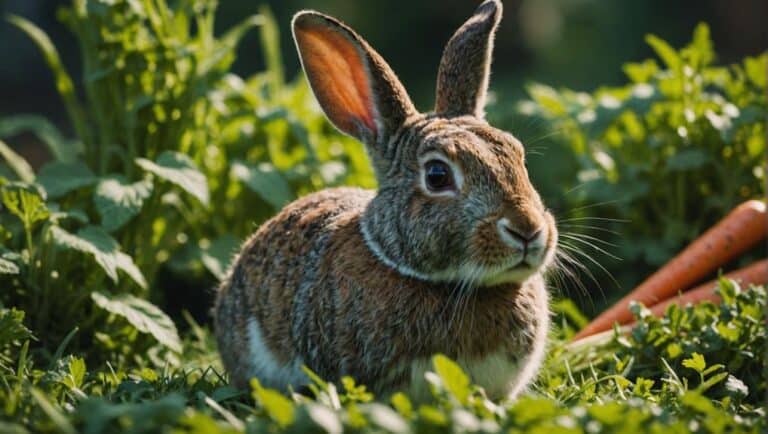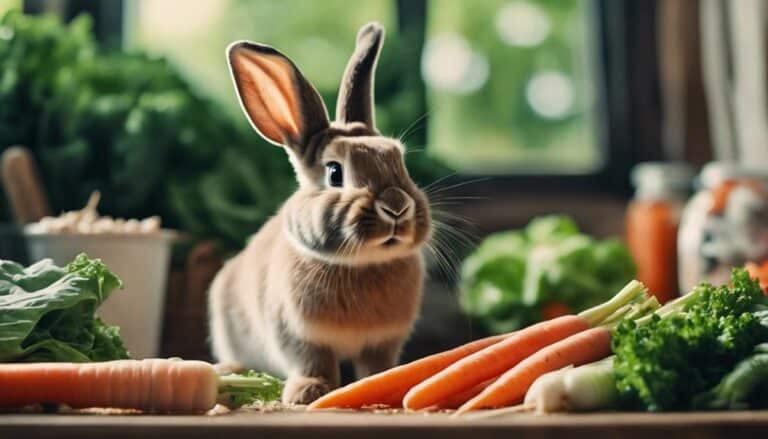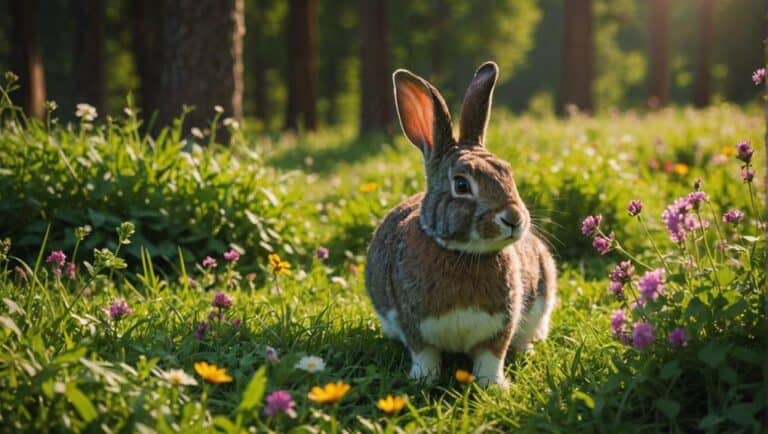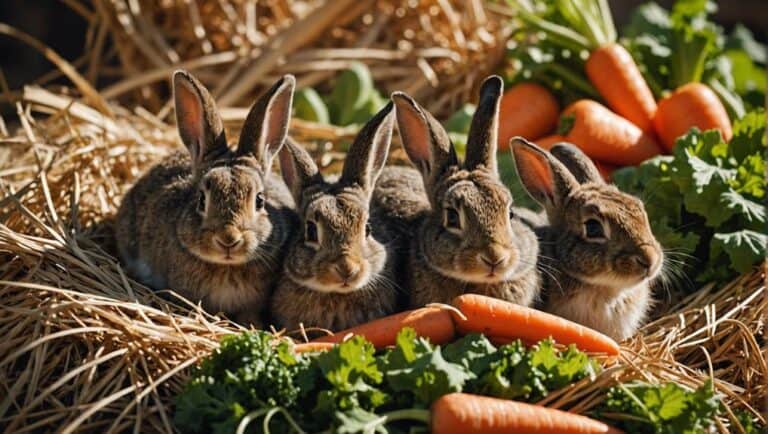When it comes to your rabbit's health, you might not realize just how essential hay is for their digestion. It makes up a significant portion of their diet, providing the fiber necessary for smooth gastrointestinal function. Without enough hay, rabbits can face serious health issues, including painful conditions that can affect their overall well-being. Understanding the types of hay available and how much to provide can make a real difference. So, what are the best options for your furry friend, and how can you encourage them to enjoy it?
Contents
Importance of Hay for Rabbits
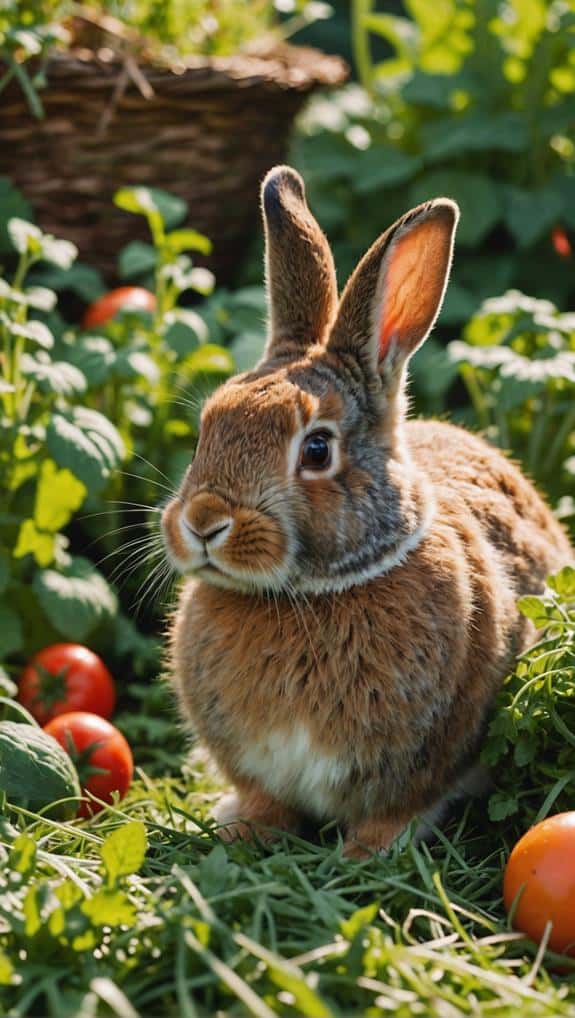
Hay plays an essential role in your rabbit's diet, making up 80-90% of what they eat daily. The significance of hay can't be overstated, as it provides the long fibers necessary for a healthy rabbit's digestive system.
These fibers promote ideal gut movement, ensuring that food passes smoothly through the gastrointestinal tract. This regular consumption of hay is crucial for preventing gastrointestinal blockages, which can lead to severe health issues.
Additionally, hay promotes mental stimulation and physical activity in rabbits, contributing to their overall well-being the crucial role of hay.
Additionally, hay serves as a natural solution for managing your rabbit's dental health. Since rabbit teeth grow continuously, hay helps wear them down, reducing the risk of dental problems.
By encouraging natural foraging behavior, hay also supports good litter box habits, integrating eating and bathroom processes effectively.
Beyond physical benefits, hay contributes to your rabbit's mental well-being. The high-fiber content keeps your pet engaged, reducing boredom and the likelihood of destructive chewing behaviors.
By providing a consistent supply of hay, you not only promote your rabbit's digestive health but also enhance their overall quality of life.
Digestive Health Benefits
A rabbit's digestive health hinges on a diet rich in fiber, which is primarily provided by hay. This necessary fiber promotes regular gastrointestinal movement, preventing issues like GI stasis. When your rabbit has unlimited access to high-quality hay, it guarantees smooth digestion and ideal nutrient absorption.
Regular fiber intake not only prevents gastrointestinal blockages but also contributes to healthy fecal production, often seen as golden poops. Moreover, hay constitutes 80-90% of a rabbit's diet, making it essential for nutrition and overall wellness, as it aids in producing necessary fecal pellets and the importance of cecotropes for gut health.
Continuous chewing of fibrous hay is imperative for maintaining dental health in rabbits. As their teeth continuously grow, chewing hay helps wear them down, preventing dental problems that can arise from overgrowth.
In addition, the indigestible fibers in hay support a healthy cecal flora, which is fundamental for overall gut health and helps prevent harmful bacterial overgrowth.
Types of Hay Available
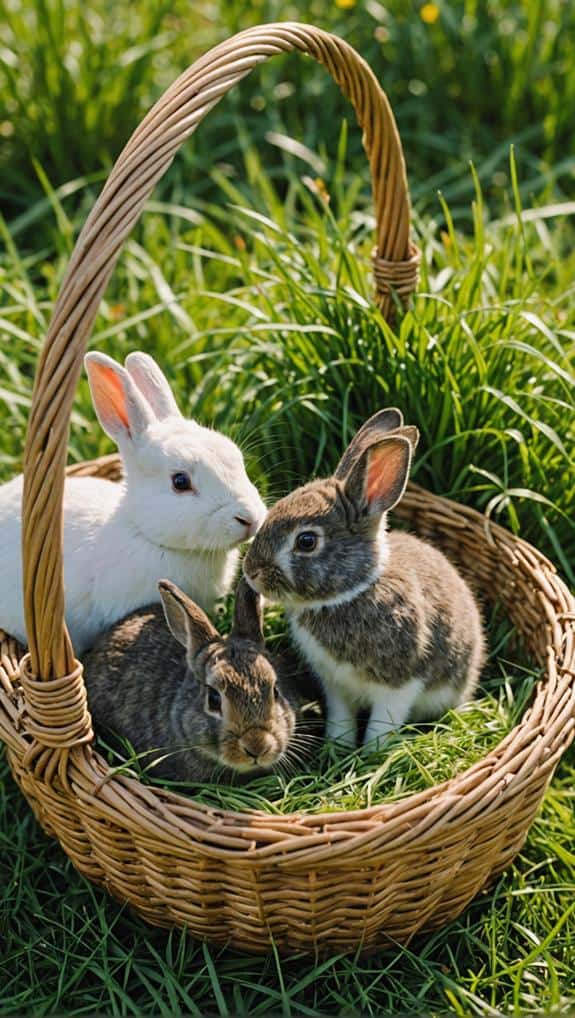
When selecting hay for your rabbit, understanding the different types available is vital. Grass hays, like Timothy and Orchard grass, provide essential fiber for digestion and should constitute the majority of their diet. Additionally, legume hays, such as Alfalfa, are richer in proteins and should be offered sparingly, primarily to young rabbits or those with specific dietary needs. It’s important to remember that the best hay options for rabbit health not only promote digestive well-being but also help maintain healthy teeth. Providing a variety of hays can encourage foraging behavior, making mealtime more enjoyable for your furry friend.
Additionally, incorporating a variety of safe vegetables can enhance their overall nutrition, as outlined in rabbit dietary essentials.
Alfalfa hay, though nutritious, should only be given to young rabbits due to its high protein content.
Always prioritize quality by avoiding dusty or poor-quality options to guarantee your rabbit remains healthy and happy.
Grass Hay Varieties
Choosing the right grass hay is imperative for your rabbit's health and well-being. Grass hay varieties provide the necessary fiber to support digestive health, and it's essential to select high-quality options.
Here are some of the best choices for your rabbit:
- Timothy Hay: The most recommended type, favored for its high fiber content, which is important for adult rabbits.
- Orchard Grass Hay: This softer hay is sweeter in taste, making it appealing to rabbits who may be picky eaters.
- Brome Hay: Offers a mix of textures and flavors, encouraging natural foraging behaviors and consistent eating habits.
- Mixed Grass Hays: These provide variety in taste and texture, preventing boredom while guaranteeing balanced nutrition.
When selecting hay, always choose fresh, clean options that are green, fragrant, and free from dust or mold.
Experimenting with different grass hays not only caters to your rabbit's preferences but also guarantees they receive the necessary nutrients without the high protein and calcium found in alfalfa hay.
Prioritizing quality hay is key to maintaining your rabbit's overall health.
Alfalfa Hay Limitations
Alfalfa hay, while enticing to many rabbits due to its rich protein and calcium content, poses significant limitations for adult rabbits.
Although it's suitable for young or growing rabbits under 6-8 months, the high levels of protein and calcium can lead to obesity and urinary issues in adults. For your adult rabbit, a diet primarily composed of high-fiber grass hay, such as timothy or orchard grass, is vital for maintaining ideal digestive health.
Shifting your adult rabbit from alfalfa hay to grass hay is essential for their overall well-being. While many bunnies may find alfalfa hay appealing, it's important to gradually reduce its availability to encourage acceptance of grass hay.
This change not only helps prevent gastrointestinal problems but also guarantees that your rabbit receives the necessary nutrients without the risks associated with excess protein and calcium.
If your rabbit is particularly finicky, consider mixing small amounts of alfalfa hay with grass hay to ease the shift. This way, you can satisfy their taste preferences while prioritizing their long-term health.
Choosing Quality Hay
Selecting the right type of hay can significantly impact your rabbit's health and digestion. Quality hay keeps your rabbit's digestive tract functioning smoothly, guaranteeing they maintain healthy digestion.
Here are some recommended types of hay to take into account:
- Timothy Hay: This is the most widely recommended type for adult rabbits due to its high fiber content, which supports healthy digestion and prevents gastrointestinal issues.
- Orchard Grass: Softer and more appealing to picky eaters, orchard grass also provides essential fiber, making it a great choice for maintaining digestive health.
- Alfalfa Hay: While rich in protein and calcium, alfalfa hay should be limited to young rabbits under 6-8 months, as it's not suitable for adults.
- Other Grass Hays: Hays like brome, fescue, oat, and ryegrass can diversify your rabbit's diet, improving nutrition and encouraging varied eating habits.
When selecting hay, verify it's clean and free from dust, yellowing, or any poor-quality signs, as these can harm your rabbit's health and digestion.
Recommended Hay Quantity
Rabbits need a daily hay intake that matches their body size to guarantee ideal digestive health. To maintain proper digestion, ascertain your rabbit consumes hay that constitutes about 80% of its diet. This high-fiber food is essential for preventing gastrointestinal stasis, a serious condition that can arise from insufficient fiber intake.
It's important to provide unlimited access to clean, fresh hay at all times. This not only supports their digestive health but also encourages natural foraging behaviors. While you can use old hay in litter areas to maintain hygiene, it's critical that your rabbit has access to fresh hay for optimal consumption.
Additionally, always keep fresh water available alongside hay, as hydration plays a significant role in digestion. By adhering to these guidelines, you can help promote your rabbit's overall well-being and prevent potential health issues related to their diet.
Alfalfa Hay Considerations
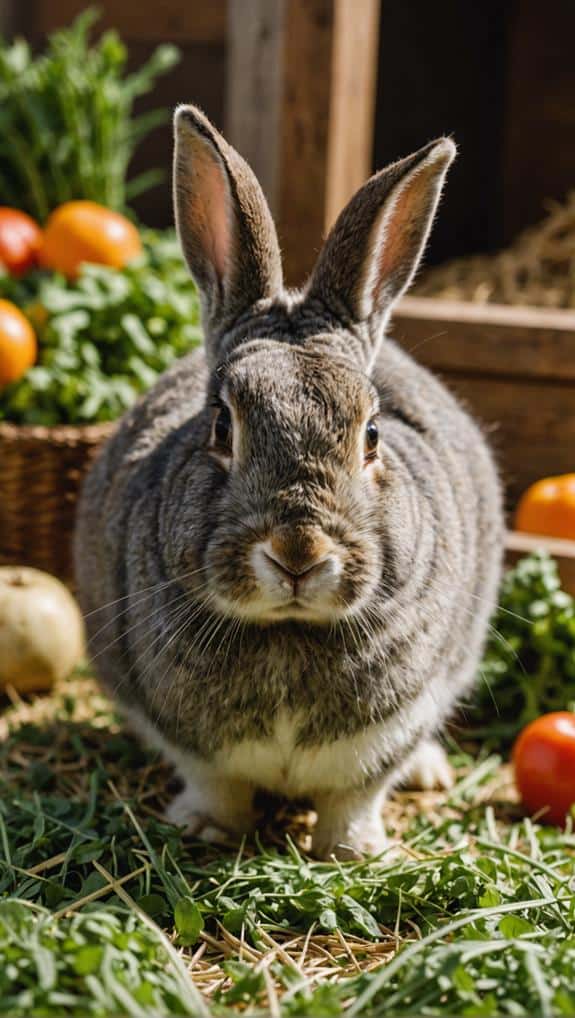
When considering alfalfa hay for your rabbit, it's important to recognize its high protein and calcium content, which benefits young bunnies but can be harmful to adults.
As your rabbit matures, you'll need to shift to grass hay gradually to promote better health. Mixing alfalfa with grass hay can help ease this shift while still appealing to your rabbit's taste preferences.
Nutritional Benefits for Bunnies
Understanding the nutritional benefits of alfalfa hay is vital for supporting the health of young rabbits. Alfalfa hay is particularly beneficial for rabbits under 6-8 months of age due to its high protein and calcium content, which are important for their growth. However, it's important to manage their intake properly to guarantee a balanced diet that supports their digestive health.
Here are some key nutritional benefits of alfalfa hay:
- High Protein: Supports the rapid growth and development of young rabbits.
- Calcium-Rich: Essential for building strong bones and teeth in growing bunnies.
- Palatable: Many young rabbits enjoy the taste, encouraging them to eat enough hay for digestion.
- Moderation is Key: While beneficial, excessive consumption can lead to obesity and urinary issues in adults.
Offering alfalfa hay in moderation helps maintain young rabbits' growth while preventing dietary imbalances as they mature.
As rabbits age, moving to grass hay is recommended to promote long-term health. Balancing their diet with these considerations guarantees that they receive the full spectrum of nutritional benefits necessary for a healthy life.
Transitioning to Grass Hay
As young rabbits grow and approach adulthood, their dietary needs shift considerably. Alfalfa hay, rich in protein and calcium, is suitable for bunnies under 6-8 months.
However, as they move to grass hay, it's vital for their health. Adult rabbits need a diet that promotes healthy digestion, which grass hays like timothy and orchard grass provide. These types of hay are high in fiber, essential for maintaining digestive health and dental well-being.
When moving to grass hay, it's important to do so gradually. Start by mixing small amounts of grass hay with alfalfa to help your rabbit adjust to the new texture and taste. This helps prevent digestive upset, especially for picky eaters.
Monitor your rabbit's weight and overall health during this progression; overconsumption of alfalfa can lead to obesity and other health issues in adult rabbits.
Encouraging Hay Consumption
Encouraging your rabbit to consume more hay is essential for their digestive health and overall well-being. A diet rich in hay not only promotes healthy digestion but also supports dental health.
Here are some effective strategies to help increase your rabbit's hay consumption:
- Reduce Pellet Intake: Gradually limit the amount of pellets you give. This stimulates your rabbit to seek out hay as an alternative food source.
- Offer Variety: Introduce different types of hay, such as timothy and orchard grass, to determine which flavors and textures your rabbit prefers.
- Add Enticing Elements: Mix herbs or grass pieces with hay to enhance its appeal, making it more enticing for your rabbit.
- Use Interactive Feeding: Place hay in various locations, including litter trays, and use tubes or baskets to stuff hay. This encourages natural foraging behavior and actively engages your rabbit, promoting a healthy life.
Preventative Health Care
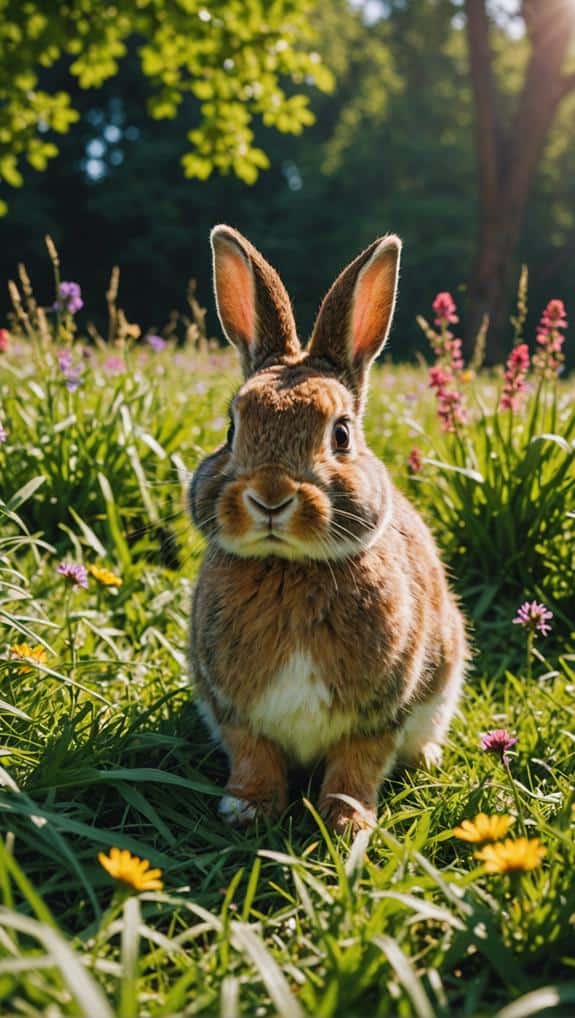
A diet rich in hay not only promotes healthy digestion but also plays a significant role in preventative health care for rabbits. Feeding your rabbit an 80% hay diet is a proactive measure against gastrointestinal (GI) diseases, ensuring proper digestive function and overall health.
Regular access to quality hay fosters consistent gastrointestinal motility and fiber intake, which is essential for preventing conditions like GI stasis. Inadequate fiber levels can lead to fecal impaction, posing serious health problems for your rabbit.
By prioritizing high-fiber hay, you help mitigate this risk and support balanced cecal flora, important for nutrient absorption and long-term well-being. Educating yourself about the importance of hay in your pet's diet enhances preventative health care practices, allowing you to serve your rabbit's needs effectively.
Incorporating a variety of hay types can also diversify the nutrients your rabbit receives, further enhancing their health profile. Remember, a well-fed rabbit is a healthier rabbit, and your commitment to providing ample hay is a crucial step in safeguarding their digestive function and overall health.
Final Thoughts
To sum up, prioritizing hay in your rabbit's diet is like giving them a ticket to a health convention. The high fiber content not only supports digestion but also keeps their teeth and gut flora in check. By ensuring they have unlimited access to fresh hay, you're setting the stage for a happy, healthy rabbit. Remember, a well-fed rabbit is a thriving rabbit, so don't overlook the importance of this essential dietary component!

